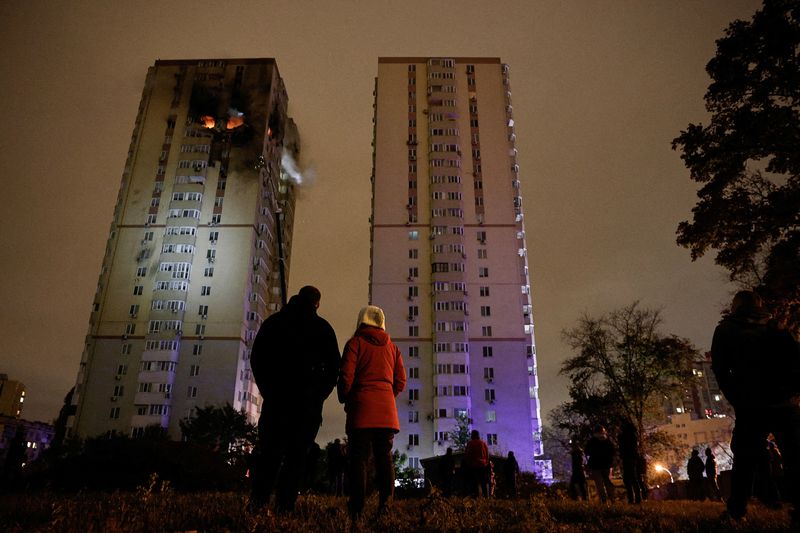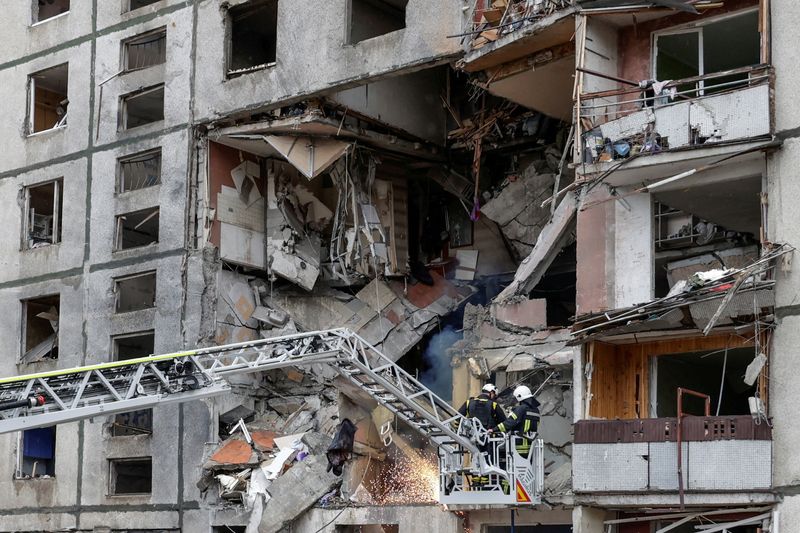By Anastasiia Malenko and Tom Balmforth
KYIV (Reuters) - For many Ukrainians, the outcome of the U.S. election next week and its impact on the war with Russia feels less likely to be pivotal than it once did.
Even with the Democrats' unprecedented military and financial aid, battlefield losses have accelerated in the east and Ukraine has grown impatient with President Joe Biden's reluctance to let it unleash Western weapons on targets deep inside Russia.
Republican presidential candidate Donald Trump, meanwhile, has criticised the level of U.S. support for Kyiv, refused to say he wants Ukraine to win the war and promised, if elected, to end the conflict before he takes office in January, without explaining how.
That has led some ordinary Ukrainians and officials to be less categorical about who they want to win the White House - Trump or Democratic contender Kamala Harris.
"If Harris wins, it will be a continuation of the sham assistance to Ukraine, which means that they will talk and do nothing," said Viktor Tupilka, 70, a former coal miner from the eastern region of Donetsk.
"If Trump wins, he will most likely push for an end to the war and give away a share of Ukraine's territory," Tupilka added, speaking in Kyiv.
"In either case, Ukraine loses (something). All our hopes are not to look at the election, but to think about how to provide for ourselves both through internal resources and otherwise."
The United States has given Ukraine tens of billions of dollars in military and financial assistance - more than any other ally - since Russia launched its full-scale war on Ukraine in February 2022.
That assistance has provided Ukraine with a lifeline for its much smaller army, but President Volodymyr Zelenskiy has said throughout the conflict that U.S. and Western support has been too little, too late to turn the tide in Ukraine's favour.
A senior European diplomat based in Kyiv said Ukrainian officials were less worried about a Trump victory than some might expect, in part because Ukraine was losing territory even with the military and economic support it receives.
"At least Trump might shake things up a bit," the diplomat told Reuters.
Trump's stated intention to try to force an end to the war in Ukraine before taking office would almost certainly require Washington to say or give something to Kyiv that is threatening to Russia, the diplomat added.
But the uncertainty over what Trump would do to try to end the war is causing considerable unease.
Volodymyr Fesenko, a Kyiv-based political analyst, said that while Trump could increase aid to Ukraine and use economic leverage to force Russia to the negotiating table, he could also threaten to cut off aid to Ukraine.
"The main problem is that Trump promises to initiate negotiations on ending the war in Ukraine immediately after his victory, but we do not know on what terms," Fesenko said.
COURTING BOTH CAMPS
Zelenskiy and his government have been careful to avoid publicly siding with one candidate over the other, wary of alienating the eventual winner. Foreign Minister Andrii Sybiha said on Thursday Ukraine was confident of continued U.S. support regardless of who wins the election.
Following a visit to the U.S. in September, during which he met Harris and Trump, Zelenskiy said the Nov. 5 election would be likely to have an impact on Russia's readiness for negotiations even before the winning candidate assumed office.
"The United States will demonstrate the policy very quickly, after the elections, in my opinion. And from this information that I have received from the candidates, this is a positive from my meetings with them," he said.
Moscow says it wants peace, but has set conditions Kyiv regards as unacceptable. Zelenskiy has also underlined the need for a fair resolution to the war and talked of a summit later this year that could include a representative from Moscow.
Fesenko saw promises of continued support from Harris' camp as good news for Ukraine, but warned that were she to win the election the future shape of U.S. support was unclear.
"Almost no one doubts that she will continue Biden's policy of supporting Ukraine, but will this policy be more decisive or will Kamala Harris, for example, also be inclined to initiate negotiations to end the war?"
In addition to pushing for permission to use Western missiles against targets inside Russia, Ukrainian officials have publicly pointed to problems with prompt delivery of approved American aid and urged allies to deliver more air defences.
Vitaliy Novak, 53, a commercial director in the media industry, felt the significance of the outcome of the U.S. election was more clear-cut than some other Ukrainians.
"Our future depends on what happens on Nov. 5, no more, no less," he said. "This will be a pivotal moment in how events unfold - whether they will continue along the same path or we will see radical change."
But amid the debate, many Ukrainians agree it is hard to see a quick fix to the war after territorial losses in the past year, heavy military and civilian casualties, and relentless Russian attacks on energy infrastructure before winter.

"On the one hand, a horrible end is better than a horror without an end," said 20-year-old Hlib Astahov, referring to Trump's promise of a swift end to hostilities.
"On the other hand, I would not want this ongoing war - with so much effort and the lives of the best of us already spent - to simply end in some kind of fudged peace because of our Western partners."
(Tom Balmforth reported from London; additional reporting by Olena Harmash; Editing by Mike Collett-White and Timothy Heritage)
